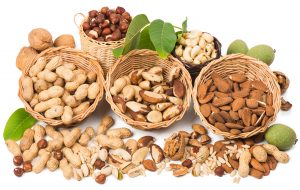Nuts are in fashion, nutritionally speaking, especially for heart health. Now, a new study finds that if you eat a handful of nuts several times a week that may help lower your risk of cancer.
Study results on nut consumption and cancer prevention have been inconsistent. In this systematic review and meta-analysis published in Nutrition Reviews, the researchers evaluated 36 studies – both large population studies and clinical trials – examining the relationship between eating nuts and risk of cancer or type 2 diabetes.
By comparing people who ate the most nuts (typically at least 4-5 times per week) to those who ate the least (typically 1 time per week or less), the researchers found that the high nut eaters had 15 percent lower risk of cancer overall. In specific cancers, they found lower risk for colorectal, endometrial and pancreatic cancer. They did not find any significant difference for risk of type 2 diabetes.
The authors note that although many of the studies took into account diet, BMI and other factors,not all did. Also it could be that the high nut eaters were healthier overall. Follow-up from initial contact ranged from 4 to 30 years and not all studies updated nut consumption information during that period. But this study adds to the body of research on the role of nuts in cancer prevention.
Nuts contain a variety of nutrients and phytochemicals that show cancer protective actions in lab studies, including polyphenols in walnuts, resveratrol and quercetin in pine nuts and dietary fiber and vitamin E in almonds and walnuts. Nuts are also part of dietary patterns shown to lower cancer risk, such as the Mediterranean diet and vegetarian diets.
If you’ve shied away from nuts because of their fat and calories, keep in mind that the fat in nuts is mostly heart healthy polyunsaturated and monounsaturated fats. One portion size of nuts is about 1/4 cup or a level adult handful. To keep calories down, enjoy the crunch and flavor of nuts using the right-sized portion with these 4 strategies:
- Add a small handful to your green salad. You don’t need a recipe – you can dress up a side or dinner salad with a little extra crunch and protein from just about any kind of nut. We do have an easy recipe though – try this colorful Arugula Salad with Kiwi, Strawberries and Pecans
- Elevate your morning bowl of steaming oatmeal by topping with fruit and nuts. Our Oatmeal with Fresh Fruit is delicious and is packed with protein, fiber and cancer-stopping nutrients.
- Take your stir-fry to a whole new level with a few nuts. Sprinkle on top just before serving, or add them at the last minute to give them a little toasting. They’ll boost the protein of a non-meat stir-fry or add a new dimension to meat based one. Check out our Cashew Stir-Fry with Broccoli and Pork
- Package up 1/4 cup of your favorite nut in a snack size plastic bag or in a small re-usable container – eat it as a morning snack, or add to yogurt or fruit salad.
For more delicious ideas on how to add nuts to your diet, search our Healthy Recipe database.
This study was partially supported by UL1 TR000135 from the National Center for Advancing Translational Sciences, a component of the National Institutes of Health.





